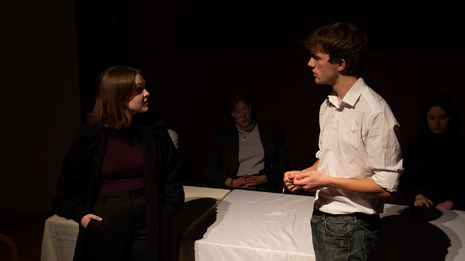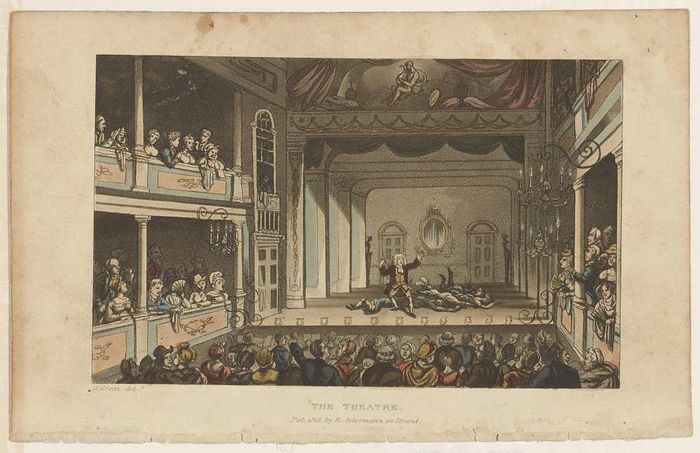Previewing The Student Union
Theatre Editor Lewis Andrews previews The Student Union, where the production team are looking for an audience

Sitting amongst the furor of the Sidgwick Site café, I talked to writer/director Jasper Cresdee-Hyde and assistant director Oscar Matthews about a play suitable for the university setting. The Student Union takes place within a fictionalized university society, however it is closer to a political satire than a reflection on the daily tribulations of student life. Pitching the play to me, Jasper explains;
JCH: It’s a political satire about what happens when four people run to become president of a student union.
OM: It starts out as a comedy, then the drama starts to build up.
JCH: When you think it’s just about student politics, it starts to get more and more intense. We employ elements of multimedia which add to the drama. It strikes a tone where these are realistic people, so as much as it is funny, it becomes quite dark. It will tackle themes of power, truth, democracy and journalism.
At the end of the play, the audience is tasked with voting for one of the candidates to win, so the ending changes depending on their victor. There is no rigging involved, the cast have indeed rehearsed four different endings, though there are certainly references to the anti-democratic use of misinformation in modern politics. Crucially, the audience will not be allowed to abstain, despite the candidates being detestable, and thus will be directly implicated in this comedic, or perhaps terrifying, turn of events.
Whilst our politicians may carry out performative gestures in aid of winning votes, here the politicians really are just actors on a stage. This metatheatrical facet is something which is also carried into the setting;
JCH: It is set in a Magdalene lecture theatre, in fact it was written for that venue.
“A whodunnit bubbles underneath the political drama”
OM: You have these four candidates who do terrible things, and you are in this shared, student space as they appeal to you. And you have to take part in the vote. Power dynamics are very relevant in a place like Oxbridge, which we too are a part of, and this lecture theatre draws attention to that.
JCH: I also wanted to situate issues regarding the changing definitions of truth and conspiracy theories here in an elite university. Perhaps students here think they are above falling prey to conspiracies and misinformation, but these are real issues affecting our democratic process, and have dangerous means of attracting anyone’s attention.
Both Jasper and Oscar are nervous about giving away too many clues, because it seems there is also an element of mystery. A whodunnit bubbles underneath the political drama, as the audience begins to wonder why the previous president resigned… They do however introduce me to some of the thematic ambitions;
JCH: Elite institutions perhaps have a far greater impact on the wider world than we realise – this is where real power lies. Therefore, we have to ask how they are shaping the 21st century? What does the future they are making look like? And what is their role in the modern political landscape? The worldwide issues of class and power all meet here, but seemingly lie hidden.
OM: Does student politics even matter against this backdrop? Are they just a distraction? What are the bigger forces that lie behind which student politics doesn’t even scratch the surface of?
“The main takeaway will depend upon who wins the election”
These are big questions, and the production doesn’t give us a direct answer-instead it offers a cutting satire, not far removed from successful programs like Succession or The Thick of It (two shows which they cite as big influences). As I often do with interviews, I conclude by asking what they want the audience to leave thinking – but of course, with this play, it is a little different:
JCH: The main takeaway will depend upon who wins the election. It is carefully crafted so that the audience leave considering why they voted a certain way. When you leave the show, you’ll hopefully be thinking about why you chose to vote for one candidate over another. Your own internal biases will be held up for scrutiny, and you’ll leave assessing your decision.
After seeing the show, one can imagine being tempted to go watch again and see the alternate endings. Do be prepared, however, for the audience’s own fallibilities and leanings being cynically recognised and teased. “Like all good satire,” they conclude “everyone will look absurd and be made fun of, though the biggest joke will be on those who do not come!”
The Student Union runs at Magdalene College, Cripps Auditorium from 16th-19th March at 19:00
 News / Judge Business School advisor resigns over Epstein and Andrew links18 February 2026
News / Judge Business School advisor resigns over Epstein and Andrew links18 February 2026 News / Gov grants £36m to Cambridge supercomputer17 February 2026
News / Gov grants £36m to Cambridge supercomputer17 February 2026 News / Hundreds of Cambridge academics demand vote on fate of vet course20 February 2026
News / Hundreds of Cambridge academics demand vote on fate of vet course20 February 2026 News / CUCA members attend Reform rally in London20 February 2026
News / CUCA members attend Reform rally in London20 February 2026 News / Union speakers condemn ‘hateful’ Katie Hopkins speech14 February 2026
News / Union speakers condemn ‘hateful’ Katie Hopkins speech14 February 2026











